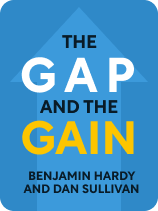

This article is an excerpt from the Shortform book guide to "The Gap and The Gain" by Benjamin Hardy and Dan Sullivan. Shortform has the world's best summaries and analyses of books you should be reading.
Like this article? Sign up for a free trial here .
What’s the best time of day to make a daily plan? What are implementation intentions and linked habits?
Gap-thinking and Gain-thinking are two different ways to interpret your achievements in life. Gap-thinking is measuring forward by using your ideal future self as the object of comparison. Gain-thinking is measuring backward by using your past self instead. In The Gap and the Gain, Dan Sullivan and Benjamin Hardy share practical recommendations on how to make a daily plan that helps you stay focused on Gains.
Keep reading for tips on planning ahead, one day at a time.
Make a Daily Plan
In their advice on how to make a daily plan, Hardy and Sullivan recommend making a plan for the next day during the last hour before you go to sleep. They argue this is the most important time of the day because what you do during it affects how well you sleep and how you approach and navigate the next day. Use this time to write in your journal. You can start with three gains you made today and then write down three gains you hope to make tomorrow. This will prime your brain to plan for the next day subconsciously as you sleep.
(Shortform note: Researchers are conflicted about what time of day is best for journaling. In the seminal 1992 self-help book The Artist’s Way, Julia Cameron suggests writing “morning pages,” or three pages of stream-of-consciousness writing that you complete first thing in the morning. She argues this boosts creativity by decluttering your mind of worries and allowing you to start your day fresh.)
You can also create and utilize implementation intentions. These are plans for worst-case scenarios that are likely to put you in the Gap mindset. This way, you’ll feel better equipped to handle negative situations that occur unexpectedly and less likely to fall into Gap-thinking. For example, if you’re trying to quit smoking, an effective implementation intention would be deciding beforehand how you’ll unwind after a stressful day without smoking. This way, you can avoid falling into the Gap mentality of resenting that you can’t smoke and instead focus on gaining healthier coping mechanisms.
Finally, the authors suggest using linked habits, which are another form of precautionary planning created by behavioral scientist BJ Fogg. These consist of adding new, healthy habits into your daily routine by placing them immediately after habits you already have. Planning ahead in this way will help you pull yourself out of the Gap mindset when you inevitably fall into it.
To create linked habits, use the formula “After I X, I will Y.” An example would be, “After I start feeling like I’m failing in life, I will ask myself, ‘am I measuring forward or measuring backward?’”
| Creating a Roadmap to Success Psychologists distinguish implementation intentions from goal intentions. The latter is simply thinking, “I want to achieve Z,” whereas the former is thinking, “When X happens, I will do Y in order to achieve Z.” Implementation intentions are more effective than goal intentions because they explicitly illustrate when and how you can work towards these goals. Similarly, linking habits together provides concrete steps you can take to attain your goals. One method to accelerate and solidify this process is to celebrate after you complete a new habit. This could involve patting yourself on the back, doing a victory dance, or bowing to an imaginary audience applauding you. Associating positive emotions with new habits will strongly reinforce these habits. |

———End of Preview———
Like what you just read? Read the rest of the world's best book summary and analysis of Benjamin Hardy and Dan Sullivan's "The Gap and The Gain" at Shortform .
Here's what you'll find in our full The Gap and The Gain summary :
- Why you must compare who you are now to who you used to be
- Why you should focus on your past rather than your future
- How Gain-Thinking can improve your happiness, self-esteem, and physical health






